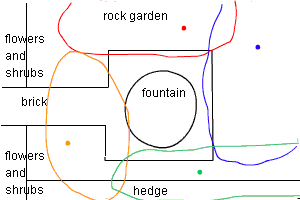Lizard Pushups: Territoriality, con't
Now that you can recognize individual lizards, and have mapped out their territories, you realize that most pushups are done on or near the borders of the territories. It is likely that the pushup behavior is a signal that plays a role in the maintenance of territories.
Although it must still remain a tentative hypothesis, it seems reasonable to assume that the pushup is an aggressive signal, rather than a friendly one. You are leaning toward this interpretation because of what follows after a pushup display: one lizard runs after the other, and the other retreats. In addition, occasionally one lizard will bite or attempt to bite the other. It can't be mating behavior because all the lizards in your backyard are female.
As you watch the lizards interact, it appears that the lizards will periodically "test" the boundaries of their territory by encroaching on a neighboring territory. After some pushups, the encroaching lizard retreats, usually chased for a distance by the resident lizard.
(hint: mouse-over the map, and watch the red and blue dots)
(Why "pushups" instead of fighting?)
One day, an unmarked lizard wanders into your yard. The reaction of the resident lizards to this stranger is striking: they chase the stranger much farther than they chase their neighbors, and they often open their mouth when chasing, as though to bite.
Is there something particularly annoying about this individual stranger,
or is it just the fact that she is not familiar to the resident lizards?
And if the latter, why would that be?

